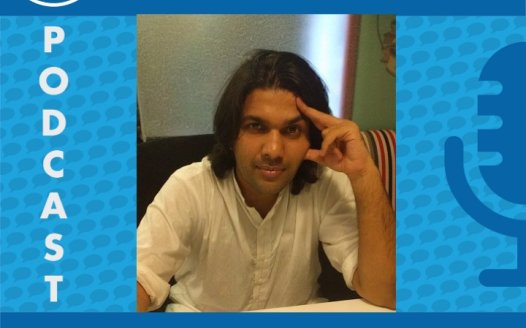Tags: Free Speech
Ep 62: Islamist ideology and free speech
Posted: Tue, 7th Dec 2021
An interview with journalist Kunwar Khuldune Shahid on Islamist ideology and jihadism, blasphemy, and the importance of free speech.
Islamist extremism has been in the news again recently, with the murder of David Amess MP. But discussion in the British media has tended to focus more on the rise in attacks on Muslims than on the ideological motivations behind Amess' murder and cases like it.
In this episode, Emma Park interviews Kunwar Khuldune Shahid, a political journalist and Pakistan Correspondent for The Diplomat.
For Kunwar, 'political Islam' is almost a tautology, since Islam is intrinsically a 'political ideology'. In his view, the difficulty with the term 'Islamophobia' is that it is used by Islamist extremists around the world to silence criticism of their regressive interpretations of their religion. He argues that criticism of religion must not be demonised as racism, and talks about the real damage which accusations of blasphemy, backed up by national law, can inflict on dissenters within Muslim-majority countries.
He also explains why Western media need to do more to acknowledge that it is possible to be culturally Muslim without believing in Islam, and to interpret Islam in a way that differs from the dogmas propounded by religious leaders on behalf of 'all Muslims'.
Correction, 7/12/21: Nadia Murad was wrongly described in the podcast as Muslim. In fact, she is a Yazidi from Sinjar, Iraq.
Follow-up
- 'Islamophobia' distracts from tackling anti-Muslim bigotry
- Asad Shah killing: 'Disrespecting Islam' murderer jailed
- Pakistan's profane blasphemy laws, by Kunwar Khuldune Shahid
- Hijab is Not a Symbol of Freedom, by Khadija Khan
- Canadian school cancels ISIS survivor Nadia Murad over Islamophobia fears
Watch this episode on YouTube | Direct MP3 Link | Transcripts
Support the podcast, share with a friend, and leave a positive review everywhere you can.
Podcast produced by Emma Park for the National Secular Society (2021). All rights reserved.
Ep 61: Books for Secularists
Posted: Tue, 16th Nov 2021
Looking to explore the currents of thought behind secularism? Here are nine books to begin with.
In this episode, Emma Park and two guests discuss books that help contextualise Britain's secularist intellectual tradition, tracing a route through classical, Enlightenment, freethought, and humanist history. Each speaker proposes three books which, in their view, embody these interconnected currents of thought in one way or another, and which celebrate free speech and open enquiry.
Bob Forder is the National Secular Society's historian, and the great-great-grandson of Robert Forder, its first paid secretary.
Maddy Goodall is Humanist Heritage Coordinator at Humanists UK and in charge of the Humanist Heritage Project.
Got a suggestion for more 'books for secularists'? Email us at podcast@secularism.org.uk or tweet to @NatSecSoc with #BooksforSecularists.
Nine books for secularists, in order of publication:
– Lucretius, On the Nature of the Universe (mid-first century BC). Prose translation e.g. by R. Latham.
– Thomas Paine, Age of Reason (1794-5)
– The Trial of the Rev. Robert Wedderburn for Blasphemy (1820)
– Edward Fitzgerald, Rubáiyát of Omar Khayyám (first edition 1859)
– Charles Bradlaugh, Speeches (1890)
– Florence Dixie, Towards Freedom (1904)
– Dora Russell, The Tamarisk Tree (1975)
– Caroline Fourest, In Praise of Blasphemy / Éloge du blasphème (2015)
– Barbara Smoker, My Godforsaken Life (2018)
Watch this episode on YouTube | Direct MP3 Link | Transcripts
Support the podcast, share with a friend, and leave a positive review everywhere you can.
Podcast produced by Emma Park for the National Secular Society (2021). All rights reserved.
Ep 57: Secularism around the world: Hungary
Posted: Tue, 21st Sep 2021
How far has Viktor Orbán's illiberal Christian regime undermined secularism in Hungary?
As part of our 'secularism around the world' series, this episode is about secularism in Hungary and the challenges it faces from Orbán's government. Emma Park is joined by Gáspár Békés, a secularist campaigner, youth rights activist and secretary of the Hungarian Atheist Society. Gáspár was recently dismissed from his job in the Mayor's Office of the Budapest City Hall for publishing articles critical of Christian practices, after a targeted campaign by Christian right-wing extremists.
Gáspár explains why church and state are so closely intertwined in modern Hungary, and how Orbán has relied on illiberal Christian values to clamp down on LGBT and reproductive rights. He also discusses the problems with Hungary's faith schools, and the reasons for the Catholic Church's continuing involvement in child protection services, despite abuse scandals.
Watch this episode on YouTube | Direct MP3 Link | Transcripts
Support the podcast, share with a friend, and leave a positive review everywhere you can.
Podcast produced by Emma Park for the National Secular Society (2021). All rights reserved.
Ep 55: Pastafarianism and the meaning of ‘religion’
Posted: Tue, 24th Aug 2021
A spoof religion devised to mock creationism has attracted a global following. But what does 'religion' mean anyway?
In this episode, Emma Park speaks to three guests with different perspectives on Pastafarianism and the challenge that it poses to religious privilege.
Derk Venema (03:20) is an assistant professor in legal philosophy at the Open University of the Netherlands. He was the legal counsel for two Pastafarians who featured in the 2020 documentary I, Pastafari. Derk talks about their court cases, the difficulties of letting the state decide what counts as a religion, and the requirement that a religious belief should be 'serious'.
Captain Tanya Watkins (28:35) is the self-appointed leader of the Church of the Flying Spaghetti Monster in Australia. She discusses her failed attempts to have her church legally incorporated, as recognised religions can do, and explains why Pastafarianism is really about being nice to people – and eating pasta.
Dr Tony Meacham (43:17) is a law lecturer at Coventry University. He considers the challenge which movements like Pastafarianism pose to traditional definitions of 'religion', and the place of religion in English law.
Watch this episode on YouTube | Direct MP3 Link | Transcripts
Support the podcast, share with a friend, and leave a positive review everywhere you can.
Podcast produced by Emma Park for the National Secular Society (2021). All rights reserved.
Ep 51: Laïcité and free speech in France
Posted: Tue, 8th Jun 2021
Satire is "the oxygen of a democracy," according to Caroline Fourest, a French writer, filmmaker, feminist, anti-extremist and former Charlie Hebdo journalist. Free speech, including satire, is a vital part of laïcité or secularism.
Secularist principles are deeply enshrined in French law and culture. In this episode, Emma Park speaks to Fourest about the place of these principles in France today, and the threat currently posed to them by Islamist extremism.
Fourest considers the role of Charlie Hebdo as a descendant of 19th-century satirical newspapers that were critical of Catholicism. She then discusses her personal experience of working at Charlie in the 2000s, and about the magazine's decision to republish the "blasphemous" cartoons of Mohammed originally printed in the Danish newspaper Jyllands-Posten.
Fourest argues that, for all satirical cartoons, the context must be considered – but that subversive humour has a vital place in a free society. She reveals the difficulties of getting a fair hearing in the British media, which often shrink from anything perceived as offensive. Her message is clear: we must be able to discuss "blasphemous" issues openly without fear of reprisals, and public figures must lead the way. If we are silent, the extremists have won.
Watch this episode on YouTube | Direct MP3 Link | Transcripts
Notes
- The outcome of the Batley investigation is a surrender of liberal principles
- Brutally murdered for doing his job
- Blasphemy in the classroom – The Batley Grammar case
Support the podcast, share with a friend, and leave a positive review everywhere you can.
Podcast produced by Emma Park for the National Secular Society (2021). All rights reserved.
The DfE must show leadership when religious hardliners turn on schools - Opinion Out Loud Ep 007
Posted: Tue, 18th May 2021
The start of an investigation into the Batley Grammar affair raises questions over the government's willingness to ensure assertive religious voices don't dictate what happens in classrooms, says Stephen Evans.
Subscribe to NSS Podcasts: Apple Podcasts | Android | Google Podcasts | Stitcher | Spotify | RSS | YouTube | Blubrry | TuneIn.
If you value the podcast please share it with a friend and leave us a positive review wherever you get it. You can also support future podcasts and our campaigns by joining the NSS or making a donation.







